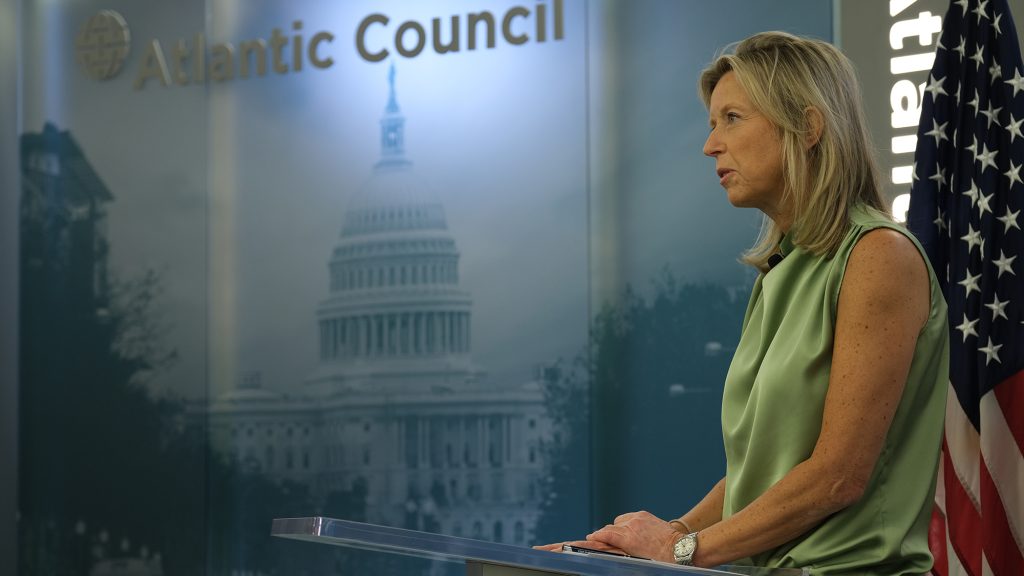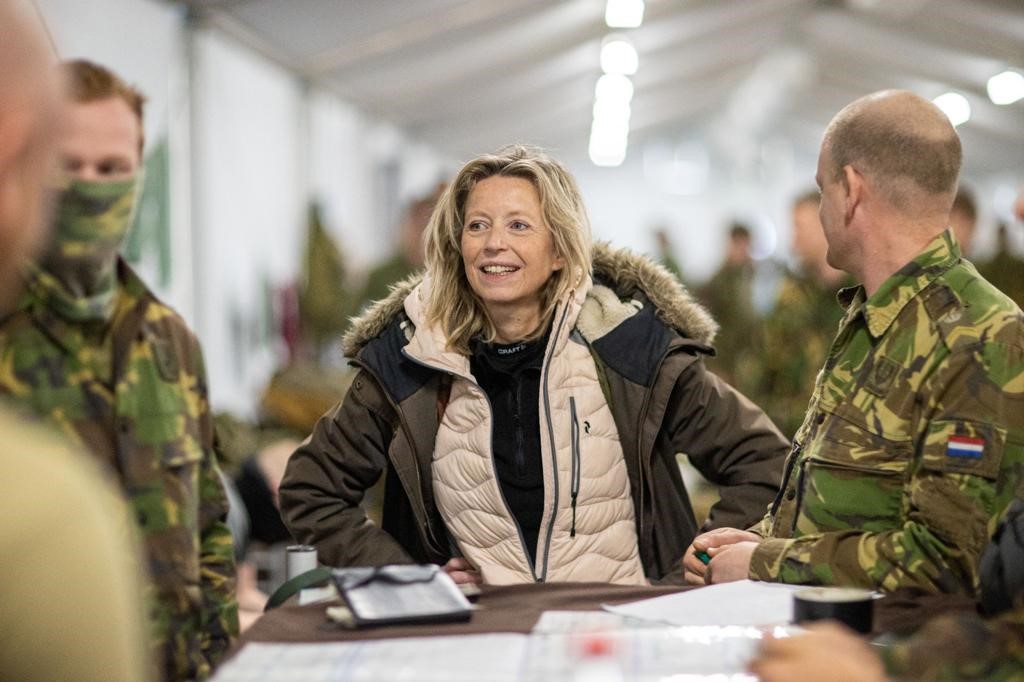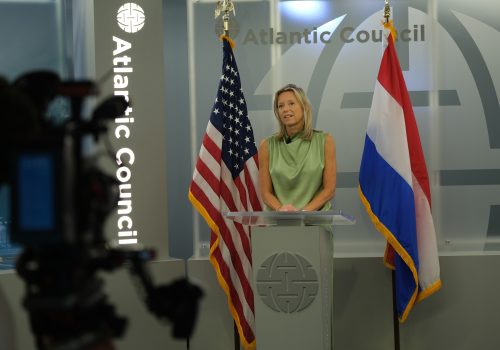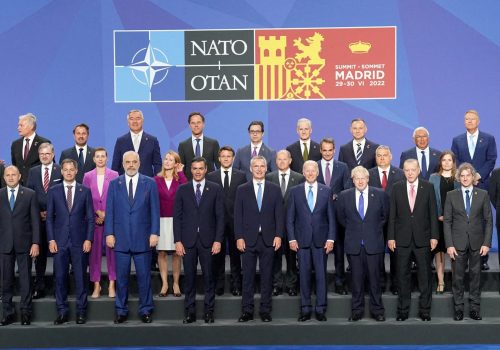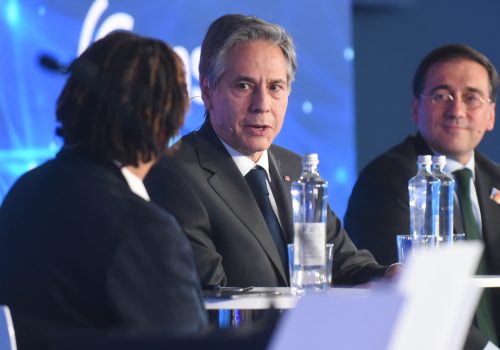Watch the full event
It’s time for the Netherlands and its European allies and partners to get “European defense in order,” said Dutch Minister of Defense Kajsa Ollongren.
One of the ways to do that: Increasing the number of countries spending at least 2 percent of their gross domestic products on defense. At an Atlantic Council Front Page event on Thursday, Ollongren said the Netherlands plans to reach that benchmark in 2024, which would amount to a 40 percent increase in its spending.
As for how the Netherlands plans to spend that boosted budget, Ollongren outlined a few priorities that also appear in the Ministry of Defense’s White Paper released earlier this year: refilling low ammunition stocks, improving troop readiness and compensation, and investing in new capabilities—for example, by ordering additional F-35s and MQ-9 Reaper unmanned aerial vehicles.
In some European countries, “we have been cutting defense spending for a very long time,” said Ollongren. “And so that means that when we are now increasing, we first have to fix what needs fixing.”
The Ministry’s White Paper is a “long-term plan,” Ollongren noted, explaining that it will take time to achieve some goals in comparison to others. But in the end, she explained, the Dutch Armed Forces “will look completely different ten years from now. It’s going to be future-oriented.”
Below are some of the highlights from Ollongren’s conversation with Breaking Defense Editor in Chief Aaron Mehta, including how the Netherlands is supporting Ukraine, shoring up European defense with allies, and tackling other challenges around the world.
The road to triumph
- Since Russia invaded Ukraine on February 24, the Netherlands has “stepped up our efforts” by sending F-16s to Poland, Dutch Patriot anti-aircraft missile systems to Slovakia, troops to Romania, and F-35s to Bulgaria, Ollongren explained.
- As for a comprehensive strategy to defend the continent, she praised the Strategic Concept unveiled at NATO’s Madrid summit last month. The document calls Russia the most significant and direct threat to Allies’ security. “The Russian Federation, as long as Putin is there at least, is a threat to Europe,” Ollongren said. She also hailed NATO’s “modern” approach to bolstering operations on the Eastern flank and in Baltic countries—in part by keeping troops in their home countries but at high readiness and alert.
- As for whether NATO will ever put boots on the ground in Ukraine, Ollongren cautioned that “Russia has nuclear capabilities, so do we; there’s always been a sort of understanding… not to risk an attack or boots on the ground.”
- Ollongren also warned that inflation is impacting Allies’ efforts, increasing the prices of some weapons “four, five, or even ten times. At this moment, that’s a real problem.” She explained that as families in the Netherlands face rising energy costs and continue to care for refugees, there is a risk that public support for the war could decline. The Dutch government will need to “keep repeating that message that [inflicting costs on Russia] comes at a price,” and help people who can’t afford to pay for necessities like energy, she said.
- Helping Ukraine is a matter of “defending the international rules-based order,” Ollongren added. “We have to show and tell that freedom will triumph in all corners of the world.” One way to do that, she said, is by tackling the food crisis resulting from a decline in Ukraine’s exports of grain. “The ball is in our court now to demonstrate through our actions that ‘might does not make right’ and that we can help solve this crisis, that it pays off to play by the rules,” said Ollongren.
- “Ukraine can prevail, with our help,” Ollongren said, adding that “Russia cannot win the war.” But in determining how this war ends, Ollongren believes “it’s not up to us to decide; I think it’s up to Ukraine.”
Transatlantic in tandem
- Ollongren recounted how, when the invasion started in February, “every country was trying to do whatever they could but there was no coordination.”
- Yet she pointed to a couple of initiatives that brought countries’ efforts together, including a recent agreement among forty-five countries at The Hague to work together on investigations into war crimes in Ukraine. She also praised the US-led Ukraine Defense Contact Group—which gathers countries to coordinate their aid to Ukraine—and said that the Netherlands “can provide more [to Ukraine] knowing that we have this partnership.”
- “We have to work in a coordinated way, not only between allies but also [between] our industries, for instance,” Ollongren explained, later adding that it is important, going forward, “to have not only more, but better capabilities… that will make us better partners in the Alliance.”
- If Allies can’t “get our act together” and “align procurement” of defense capabilities, “then it’s only going to increase prices and we’re not getting more security and more defense,” Ollongren said. She also warned that, because Putin has shown that “freedom and security cannot be taken for granted,” Europe will “need to do more together and need to be able to act, also without the United States, and to hold our own if necessary.”
- In an effort to strengthen its defense, the Netherlands is integrating its armed forces with the German armed forces, with battalions made up of soldiers from the two countries. Plus, “we’re going to take further steps, further integration,” Ollongren said, describing close cooperation with other partners’ naval and air forces. “It is working, and it has to work… it’s the way forward,” Ollongren said, noting how an integrated army will mean more budget and capabilities. “We have to step that up in Europe.”
- Another bright spot for European defense, according to Ollongren: Sweden and Finland joining NATO, bringing their “high-level” militaries and a “strategic depth” that will help defend the Baltic countries.
Over other oceans
- “There is not just one threat—there are multiple,” said Ollongren. She explained that “we cannot simply… focus on Europe for now” and “wait and see what happens next” in other areas of the world that present a threat to European security: for example, instability in the Sahel, Middle East, and Asia. “We have different theaters where we have to be active,” she said, “but luckily, we have allies so we can share that burden.”
- In the Indo-Pacific, the Netherlands is joining with close allies such as the United States, the United Kingdom, and France to support partners like Japan and South Korea in keeping an eye on threats from China and North Korea. Ollongren argued that supporting Indo-Pacific partners will not only reap benefits for global security: “We also expect [these Indo-Pacific partners] to support us when we support Ukraine.”
Katherine Walla is an assistant director of editorial at the Atlantic Council.
Watch the event
Further reading
Thu, Jul 14, 2022
Dutch Defense Minister Kajsa Ollongren: ‘It’s up to us to leave the world in better shape for future generations’
Transcript By
Minister Ollongren joined the Atlantic Council to discuss how European allies like the Netherlands are adjusting their defense policy to better deter Russia and defend every inch of NATO territory.
Thu, Jun 30, 2022
Our experts decipher NATO’s new Strategic Concept
Markup By
What were the allies really saying amid all the jargon? And what did they leave out? Our experts carefully combed through the document and dropped their insights in the margins.
Wed, Jun 29, 2022
Blinken: NATO is ‘more united, more focused’ after historic summit
New Atlanticist By
The Atlantic Council teamed up with civil society organizations at the NATO Public Forum, convening top US and global leaders for their take on NATO's priorities in a changing security environment.
Image: The Dutch Defense Minister speaking at an Atlantic Council Front Page event on July 14, 2022. Photo via the Atlantic Council.
